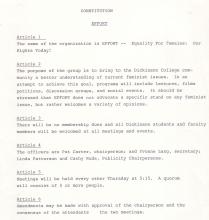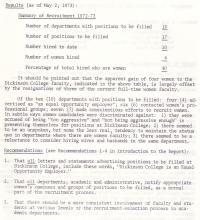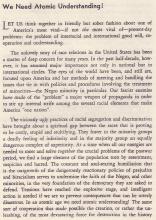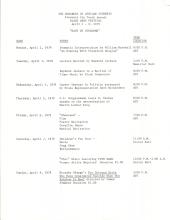Progress Report: Commission on the Status of Women at Dickinson College
This Progress Reports includes changes and plans to change College policy regarding female students. Most notably is the mention of the 1973 Spring semester and the success of the movements to "rescind the 'sex quota,' by action of the Board of Trustees, so that henceforth Dickinson College will strive for an approximate ratio of 1:1 in admissions of male and female students; and to omit singing at College functions the last verse of the Alma Mater, with its references to 'men' and 'sons.'"
"Personal Adventures in Race Relations : We Need Atomic Understanding!"
"Personal Adventures in Race Relations" by Esther Popel Shaw (class of1919), Dickinson's first African American female graduate, was published in 1946. It addresses the sources of prejudice and racism, and she urges in her introduction that cooperation is necessary to overcome these detrimental assumptions regarding African Americans. "At a time when all our energies are needed to meet and solve together the crucial problems of the postwar period, we find a large element of the population torn by resentment, suspicion and hatred.
Esther Popel Shaw's Letter to Mr. Spahr
This letter, dated September 5, 1945, was written by Esther Popel Shaw, the first African American female graduate of Dickinson College 1919, to Mr. Boyd Lee Spahr of the Board of Trustees. Writing from her post at the National Association of College Women, Esther Popel Shaw defends herself and her race against Spahr's "apparent lack of awareness of what constitutes acceptable designations when racial references are involved" as well as racial injustice when it comes to college housing for African American students.
Performance of Ntozake Shange's "For Colored Girls Who Have Considered Suicide When the Rainbow is Enuf"
On Sunday April 8, 1979, in ATS, the Symbrinct Associates performed Ntozake Shange's choreopoem, "For Colored Girls Who Have Considered suicide When the Rainbow is Enuf."
Â
The performance consisted of Seven Black women performing and dancing a book of poems to the sounds of Jazz. "The women speak, and tell stories of pain, of joy, of struggle, of coming of age as a black woman in America. Although the play addresses the emotionality of the black woman, it posseses a universal quality and delivers a message that can be understood and appreciated by all."
Â





